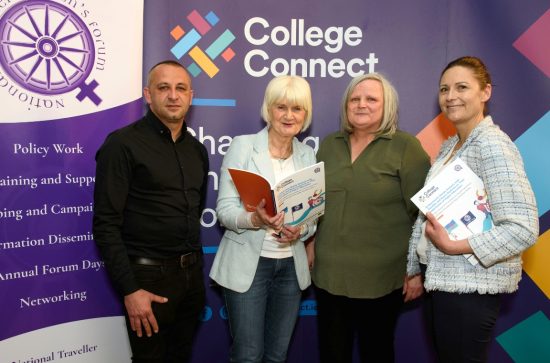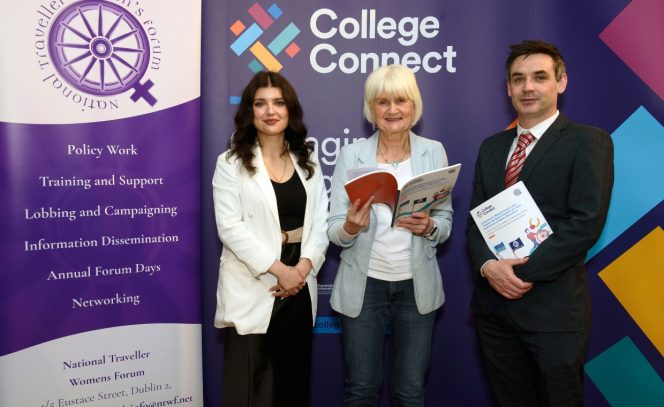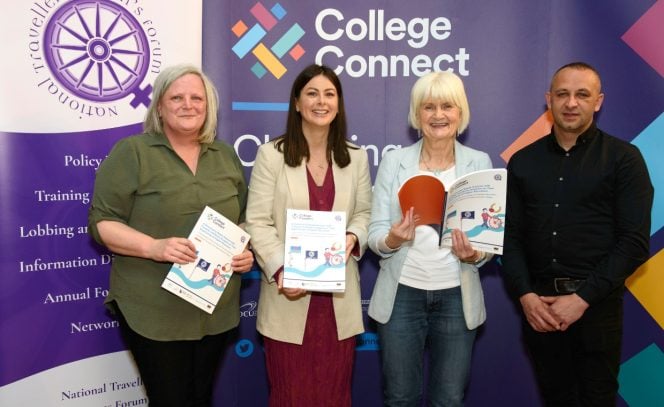
Traveller and Roma students continue to face persistent and systemic barriers in higher education, according to a new report launched today by Marian Harkin TD, Minister of State for Further and Higher Education, Research, Innovation and Science.
The Community Needs Analysis on the experiences of Traveller and Roma students with higher education was conducted by College Connect, a collaborative initiative of four higher education institutions -- Maynooth University, Dublin City University, Dundalk Institute of Technology, and Technological University of the Shannon: Midlands Midwest.
The study was developed in partnership with the National Traveller Women’s Forum (NTWF) and supported by Pavee Point. It is centred on the voices of 32 Traveller and Roma students and offers powerful insights into the experiences of racism, financial hardship and the pressure to conceal identity that many face.
Key findings from the research reveal distinct challenges for Traveller and Roma students. These include shared experiences of significant, persistent structural racism and intergenerational trauma stemming from discrimination throughout their educational journeys, often accompanied by low expectations from educators.
Both communities face substantial financial barriers hindering their access to and success in higher education. Each group emphasised the challenges of navigating and sometimes concealing their cultural identities within academic environments.
One student shared: “Throughout my educational journey, I hid my identity… because it’s a defence mechanism to have equal treatment.”
Others described a lack of belonging and uncertainty about their right to access support. Despite these challenges, the report also highlights resilience and determination, with many students calling for action to ensure that future generations have a more inclusive experience in higher education.
The report calls for the development of a Traveller and Roma Higher Education Inclusion Strategy and contains eleven key recommendations including:
- Implement a national, coordinated approach to supporting Traveller and Roma higher education students: Establish a unified national framework to deliver consistent, targeted support for Traveller and Roma students across all higher education institutions.
- Mandate anti-racism and cultural awareness training: Require all staff and students in HEIs to undergo mandatory anti-racism and cultural awareness training.
- Establish flexible access routes: Adapt access routes to higher education for Traveller and Roma students by recognising their diverse pathways. Introduce tailored skills programmes to help develop essential academic skills and eliminate unnecessary documentation for entry.
- Develop employment pathways and postgraduate outcomes: Build strong partnerships with employers to develop paid internships, job placements, and career development programmes designed specifically for Traveller and Roma students.
Welcoming the report, Marian Harkin, Minister of State at the Department of Further and Higher Education, Research, Innovation and Science, said: "I welcome the findings of this report, which highlights that although we have made positive progress in recent years in creating better conditions and more opportunities for Traveller and Roma students to access and succeed in higher education, we still have much work ahead in this regard.
“As we move forward with implementing the new Traveller and Roma Education Strategy (TRES) 2024 – 2030 alongside our colleagues in the Department of Education and Youth and the Department of Children, Disability and Equality and continue our work on the National Access Plan 2022 - 2028, the recommended actions within this report will assist us in fulfilling our Department's commitments to the strategy's objectives.”
Dr Rose Ryan, Director of Access at Maynooth University, said: "This report gives us a clear call to action. Traveller and Roma students are not just asking for individual supports — they are calling for systemic change that values their identity, addresses racism, and supports their right to succeed in higher education."
Maria Joyce, Chairperson of the NTWF, added: "The findings make clear that inclusion cannot be left to chance. We now need the political will and institutional leadership to implement these recommendations and ensure they lead to real and lasting change."
Lead researcher Eilís Ní Chorcora noted: "Traveller and Roma students should not have to navigate these systems alone. The absence of a coordinated national response creates risk, both to individual wellbeing and to institutional integrity. This report provides a roadmap for change — developed with, and for, students themselves."
The full report, A Community Needs Analysis with Traveller and Roma Students on Their Experiences of Higher Education: A Call to Action for Accountable and Transformative Policy and Practice Throughout the Higher Education System, is available here.
 |
 |
Minister of State Marian Harkin TD with MU research team members, Vanessa Paszkowska of Pavee Point and David Joyce of College Connect; Minister of State Harkin with Maria Joyce, Co-ordinator of the NTWF, Eilís Ní Chorcora, Research Manager at College Connect and Rudolf Simonic, Roma Community Development Worker at Pavee Point
